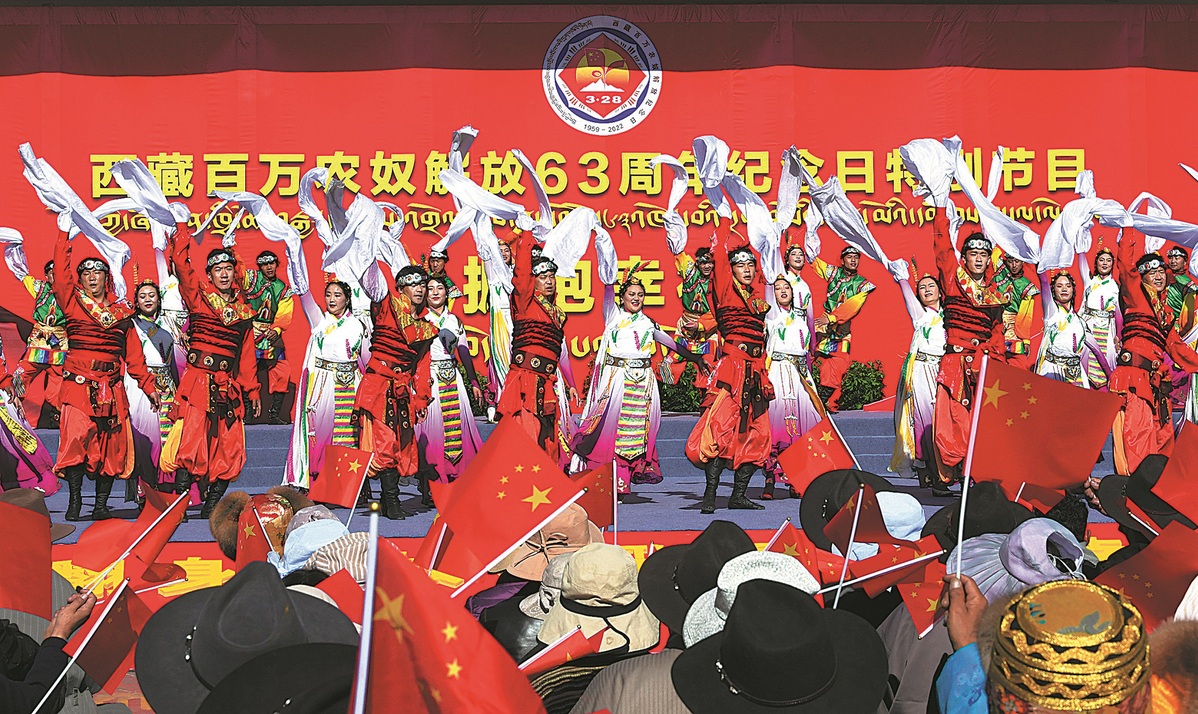Tibet marks 63 years since democratic reform


People from all walks of life took part in activities to mark the 63rd Serfs' Emancipation Day in the Tibet autonomous region on Monday.
More than 1,000 people attended a flag-raising ceremony at Potala Palace Square in Lhasa, the regional capital, on Monday morning to celebrate the region's democratic reform.
The annual Serfs' Emancipation Day is held on March 28 to commemorate the 1959 democratic reform in Tibet that saw people from all ethnic groups overthrow the region's feudal system of serfdom.
Since 2009, March 28 has been celebrated in the region as Serfs' Emancipation Day.
"Time is the most objective recorder, and history is the most faithful witness. Over the past 63 years we have witnessed magnificent progress in Tibet," Yan Jinhai, chairman of the regional government, said in a televised speech.
He said the breathtaking progress made over the 63 years demonstrates the superiority of the performance of the socialist system in the region.
Before 1959, the region was extremely poor and suffered from food shortages, Yan said, adding that absolute poverty has been eradicated and all people in the region now live in an overall well-off society.
He said that before democratic reform, the region's people had little opportunity to go to school or see a doctor, but now there is free public education for up to 15 years from kindergarten to high school.
"There are medical facilities in both urban and rural areas, and the region's average life expectancy now exceeds 72 years," Yan said.
On Monday morning, a symposium was held in Lhasa to mark the special day.
Champa Tashi, a Lhasa resident who addressed the symposium, recalled hearing many stories of the dark days of serfdom from his family and elderly community members.
"Under the dark, reactionary and barbarous feudal serfdom, serfs were subjected to cruel exploitation and oppression, and their lives were worse than that of animals," the 43-year-old said.
Champa Tashi grew up in Lhasa's Luguk community, which before 1959 was severely impoverished with hunger, disease and a high mortality rate. But a lot has changed since then.
"Thanks to the Communist Party of China and the government, people today enjoy a quality life, the community is clean, and we have plenty of products to buy in shops in our community," he said.
"We live in a big and bright house, hospitals are easily accessible and affordable for treatment, and our children also have the chance to receive a fair and good education."
- China's Kuaizhou-11 Y8 rocket launches space experimental spacecraft into space
- Relic dates Jinan founding to around 4,200 years ago
- New rocket set to debut soon, launch six satellites
- Taiwan's character of the year a vote against confrontation
- Wave of freezing weather brings snow to northern China
- APEC 'China Year' kicks off at Shenzhen meeting




































